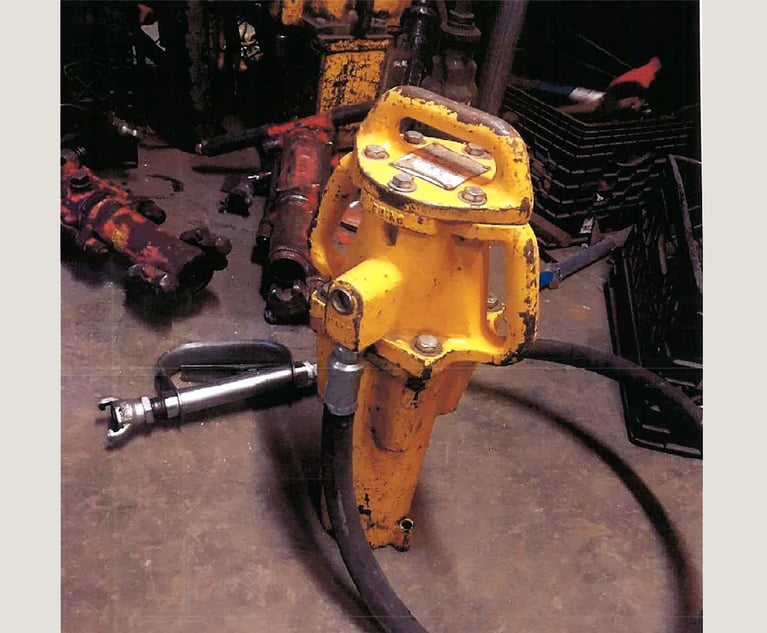 Credit: xy/Adobe Stock
Credit: xy/Adobe Stock The 'Forbidden Conduct' Defense: Is It a Subset of the 'Sole Proximate Cause' Defense or an Entirely Different Animal?
Are these really "sole proximate cause" defenses or are they an entirely different animal? That threshold question, which may or may not give rise to the same answer for all three variants of the Forbidden Conduct argument, matters.
November 03, 2022 at 10:00 AM
24 minute read
Settled law holds that "mere comparative negligence" is not a defense, and will not reduce the worker's recovery, when the subject injury arises from a failure to provide "proper protection" as to an elevation risk within the ambit of Labor Law §240. Yang v. City of New York, 207 A.D.3d 791, 794 (2d Dept. 2022); Pimentel v. DE Frgt., 205 A.D.3d 591, 593 (1st Dept. 2022). On the other hand, recovery under the statute will be barred if the worker's own negligence was the "sole proximate cause" of the subject injury. Barreto v. Metro. Transp. Auth., 25 N.Y.3d 426, 433 (2015).
The issue of whether the worker's own carelessness or misconduct was "mere comparative negligence" or the "sole proximate cause" of the accident is, in consequence, a frequently recurring issue and the Court of Appeals has enunciated some specific standards and rules that govern in some of the contexts in which the issue has arisen. Three contexts in which we have definitive standards, discussed below, are (1) where the worker's allegedly negligent choice of the elevating device is claimed to have been the "sole proximate cause" of the subject accident; (2) where the worker's failure to use an allegedly available safety device is claimed to have been the "sole proximate cause" of his or her accident; and (3) where the worker deliberately chooses not to use any elevating device at all, even though one was "readily available," and thereby sustains injury.
This content has been archived. It is available through our partners, LexisNexis® and Bloomberg Law.
To view this content, please continue to their sites.
Not a Lexis Subscriber?
Subscribe Now
Not a Bloomberg Law Subscriber?
Subscribe Now
NOT FOR REPRINT
© 2025 ALM Global, LLC, All Rights Reserved. Request academic re-use from www.copyright.com. All other uses, submit a request to [email protected]. For more information visit Asset & Logo Licensing.
You Might Like
View All
Decision of the Day: Court Holds Accident with Post Driver Was 'Bizarre Occurrence,' Dismisses Action Brought Under Labor Law §240

Cleary vs. White & Case: NY Showdown Over $5 Billion Brazilian Bankruptcy


Law Firms Mentioned
Trending Stories
- 1Parties’ Reservation of Rights Defeats Attempt to Enforce Settlement in Principle
- 2ACC CLO Survey Waves Warning Flags for Boards
- 3States Accuse Trump of Thwarting Court's Funding Restoration Order
- 4Microsoft Becomes Latest Tech Company to Face Claims of Stealing Marketing Commissions From Influencers
- 5Coral Gables Attorney Busted for Stalking Lawyer
Who Got The Work
J. Brugh Lower of Gibbons has entered an appearance for industrial equipment supplier Devco Corporation in a pending trademark infringement lawsuit. The suit, accusing the defendant of selling knock-off Graco products, was filed Dec. 18 in New Jersey District Court by Rivkin Radler on behalf of Graco Inc. and Graco Minnesota. The case, assigned to U.S. District Judge Zahid N. Quraishi, is 3:24-cv-11294, Graco Inc. et al v. Devco Corporation.
Who Got The Work
Rebecca Maller-Stein and Kent A. Yalowitz of Arnold & Porter Kaye Scholer have entered their appearances for Hanaco Venture Capital and its executives, Lior Prosor and David Frankel, in a pending securities lawsuit. The action, filed on Dec. 24 in New York Southern District Court by Zell, Aron & Co. on behalf of Goldeneye Advisors, accuses the defendants of negligently and fraudulently managing the plaintiff's $1 million investment. The case, assigned to U.S. District Judge Vernon S. Broderick, is 1:24-cv-09918, Goldeneye Advisors, LLC v. Hanaco Venture Capital, Ltd. et al.
Who Got The Work
Attorneys from A&O Shearman has stepped in as defense counsel for Toronto-Dominion Bank and other defendants in a pending securities class action. The suit, filed Dec. 11 in New York Southern District Court by Bleichmar Fonti & Auld, accuses the defendants of concealing the bank's 'pervasive' deficiencies in regards to its compliance with the Bank Secrecy Act and the quality of its anti-money laundering controls. The case, assigned to U.S. District Judge Arun Subramanian, is 1:24-cv-09445, Gonzalez v. The Toronto-Dominion Bank et al.
Who Got The Work
Crown Castle International, a Pennsylvania company providing shared communications infrastructure, has turned to Luke D. Wolf of Gordon Rees Scully Mansukhani to fend off a pending breach-of-contract lawsuit. The court action, filed Nov. 25 in Michigan Eastern District Court by Hooper Hathaway PC on behalf of The Town Residences LLC, accuses Crown Castle of failing to transfer approximately $30,000 in utility payments from T-Mobile in breach of a roof-top lease and assignment agreement. The case, assigned to U.S. District Judge Susan K. Declercq, is 2:24-cv-13131, The Town Residences LLC v. T-Mobile US, Inc. et al.
Who Got The Work
Wilfred P. Coronato and Daniel M. Schwartz of McCarter & English have stepped in as defense counsel to Electrolux Home Products Inc. in a pending product liability lawsuit. The court action, filed Nov. 26 in New York Eastern District Court by Poulos Lopiccolo PC and Nagel Rice LLP on behalf of David Stern, alleges that the defendant's refrigerators’ drawers and shelving repeatedly break and fall apart within months after purchase. The case, assigned to U.S. District Judge Joan M. Azrack, is 2:24-cv-08204, Stern v. Electrolux Home Products, Inc.
Featured Firms
Law Offices of Gary Martin Hays & Associates, P.C.
(470) 294-1674
Law Offices of Mark E. Salomone
(857) 444-6468
Smith & Hassler
(713) 739-1250






